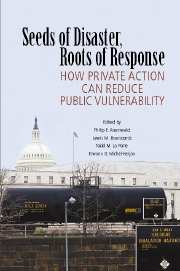Book contents
- Frontmatter
- Contents
- List of Contributors
- Foreword, by General Robert T. Marsh
- Preface
- Acknowledgments
- I SEEDS OF DISASTER
- II A CRITICAL CHALLENGE
- III MANAGING ORGANIZATIONS
- IV SECURING NETWORKS
- V CREATING MARKETS
- VI BUILDING TRUST
- 22 Public–Private Collaboration on a National and International Scale
- 23 Information Sharing with the Private Sector: History, Challenges, Innovation, and Prospects
- 24 Sharing the Watch: Public–Private Collaboration for Infrastructure Security
- 25 The Paris Initiative, “Anthrax and Beyond”: Transnational Collaboration Among Interdependent Critical Networks
- VII ROOTS OF RESPONSE
- References
- Contributors
- Author Index
- Subject Index
25 - The Paris Initiative, “Anthrax and Beyond”: Transnational Collaboration Among Interdependent Critical Networks
Published online by Cambridge University Press: 30 July 2009
- Frontmatter
- Contents
- List of Contributors
- Foreword, by General Robert T. Marsh
- Preface
- Acknowledgments
- I SEEDS OF DISASTER
- II A CRITICAL CHALLENGE
- III MANAGING ORGANIZATIONS
- IV SECURING NETWORKS
- V CREATING MARKETS
- VI BUILDING TRUST
- 22 Public–Private Collaboration on a National and International Scale
- 23 Information Sharing with the Private Sector: History, Challenges, Innovation, and Prospects
- 24 Sharing the Watch: Public–Private Collaboration for Infrastructure Security
- 25 The Paris Initiative, “Anthrax and Beyond”: Transnational Collaboration Among Interdependent Critical Networks
- VII ROOTS OF RESPONSE
- References
- Contributors
- Author Index
- Subject Index
Summary
It has been rather misleading and unfortunate that the academic study of crisis management was initiated chiefly by the Cuba missile crisis in 1962…. It appeared to approximate to the form of a “two-person game”…. The episode really did look rather like a diplomatic chess game…. If there is a “game” model for crisis, it [is] certainly not chess, but poker for five or six hands in the traditional Wild West saloon, with the participants all wearing guns, and quickness on the draw rather than the fall of the diplomatic cards tending to determine who eventually acquire the jackpot.
- Coral Bell, Decisionmaking by Governments in Crisis Situations, 1978As previous chapters of this book highlight, organizations face a new web of challenges made of “unconventional” events. They reflect more than mere local incidents and stationary trends in the occurrence of untoward events. Rather, global turbulences, real-time large-scale risks, and out-of-scale domino effects in an increasingly interdependent world demonstrate that the actions of one organization can have a direct or indirect impact on others thousands of miles away. In an editorial we published in the autumn of 2005, we argued that these untoward events frame “a whole new ball game.”
Most people can deal with well-known risks that could cause local damage. As a result, most crisis management tools developed over the past 20 years are based on the outdated assumption that risks are always formatted – that is, that it is possible to list all untoward events that could happen, determine their probability based on past experience, and measure the costs and benefits of specific mitigation measures.
- Type
- Chapter
- Information
- Seeds of Disaster, Roots of ResponseHow Private Action Can Reduce Public Vulnerability, pp. 457 - 480Publisher: Cambridge University PressPrint publication year: 2006

